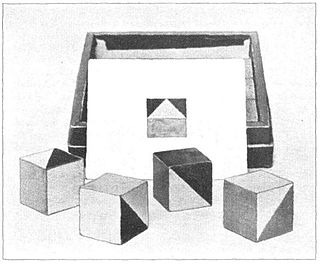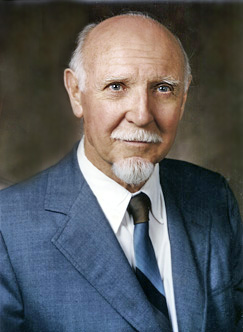Related Research Articles
Educational psychology is the branch of psychology concerned with the scientific study of human learning. The study of learning processes, from both cognitive and behavioral perspectives, allows researchers to understand individual differences in intelligence, cognitive development, affect, motivation, self-regulation, and self-concept, as well as their role in learning. The field of educational psychology relies heavily on quantitative methods, including testing and measurement, to enhance educational activities related to instructional design, classroom management, and assessment, which serve to facilitate learning processes in various educational settings across the lifespan.
Psychological testing refers to the administration of psychological tests. Psychological tests are administered or scored by trained evaluators. A person's responses are evaluated according to carefully prescribed guidelines. Scores are thought to reflect individual or group differences in the construct the test purports to measure. The science behind psychological testing is psychometrics.
Intellectual giftedness is an intellectual ability significantly higher than average. It is a characteristic of children, variously defined, that motivates differences in school programming. It is thought to persist as a trait into adult life, with various consequences studied in longitudinal studies of giftedness over the last century. These consequences sometimes includes stigmatizing and social exclusion. There is no generally agreed definition of giftedness for either children or adults, but most school placement decisions and most longitudinal studies over the course of individual lives have followed people with IQs in the top 2.5 percent of the population—that is, IQs above 130. Definitions of giftedness also vary across cultures.

David "Weshy" Wechsler was a Romanian-American psychologist. He developed well-known intelligence scales, such as the Wechsler Adult Intelligence Scale (WAIS) and the Wechsler Intelligence Scale for Children (WISC) to get to know his patients at Bellevue Hospital. A Review of General Psychology survey, published in 2002, ranked Wechsler as the 51st most cited psychologist of the 20th century.

Robert J. Sternberg is an American psychologist and psychometrician. He is a Professor of Human Development at Cornell University.
The Wechsler Intelligence Scale for Children (WISC) is an individually administered intelligence test for children between the ages of 6 and 16. The Fifth Edition is the most recent version.
Alan S. Kaufman is an American psychologist, writer, and research professor known for his work on intelligence testing.

The Kohs Block test, also known as the Kohs Block Design Test, is a performance test designed to be an IQ test. The test taker must, using 16 colored cubes, replicate the patterns displayed on a series of test cards. The design of the test was motivated by a belief that the test could easily be administered to persons with language or hearing disabilities.
Seymour Bernard Sarason was Professor of Psychology Emeritus at Yale University, where he taught from 1945 to 1989. He is the author of over forty books and over sixty articles, and he is considered to be one of the most significant American researchers in education, educational psychology, and community psychology. One primary focus of his work was on education reform in the United States. In the 1950s he and George Mandler initiated the research on test anxiety. He founded the Yale Psycho-Educational Clinic in 1961 and was one of the principal leaders in the community psychology movement. In 1974, he proposed psychological sense of community, a central concept in community psychology. Since then, sense of community has become a well-known and commonly used term both in academic and non-academic settings.
The Kaufman Assessment Battery for Children (KABC) is a clinical instrument for assessing cognitive development. Its construction incorporates several recent developments in both psychological theory and statistical methodology. The test was developed by Alan S. Kaufman and Nadeen L. Kaufman in 1983 and revised in 2004. The test has been translated and adopted for many countries, such as the Japanese version of the K-ABC by the Japanese psychologists Tatsuya Matsubara, Kazuhiro Fujita, Hisao Maekawa, and Toshinori Ishikuma.

The Cattell–Horn–Carroll theory, is a psychological theory on the structure of human cognitive abilities. Based on the work of three psychologists, Raymond B. Cattell, John L. Horn and John B. Carroll, the Cattell–Horn–Carroll theory is regarded as an important theory in the study of human intelligence. Based on a large body of research, spanning over 70 years, Carroll's Three Stratum theory was developed using the psychometric approach, the objective measurement of individual differences in abilities, and the application of factor analysis, a statistical technique which uncovers relationships between variables and the underlying structure of concepts such as 'intelligence'. The psychometric approach has consistently facilitated the development of reliable and valid measurement tools and continues to dominate the field of intelligence research.

IQ classification is the practice of categorizing human intelligence, as measured by intelligence quotient (IQ) tests, into categories such as "superior" or "average".

Leta Stetter Hollingworth was an American psychologist, educator, and feminist. Hollingworth also made contributions in psychology of women, clinical psychology, and educational psychology. She is best known for her work with gifted children.
Mary Nacol Meeker (1921–2003), was an American educational psychologist and entrepreneur. She is best known for her applying J. P. Guilford's Structure of Intellect theory of human intelligence to the field of education.
The Das–Naglieri cognitive assessment system (CAS) test is an individually administered test of cognitive functioning for children and adolescents ranging from 5 through 17 years of age that was designed to assess the planning, attention, simultaneous and successive cognitive processes as described in the PASS theory of intelligence.
Cross-battery assessment (XBA) is the process by which psychologists use information from a number of test batteries to help guide diagnostic decisions and to gain a fuller picture of an individual's cognitive abilities than can be ascertained through single-battery assessments. XBA was first introduced in the late 1990s by Dawn Flanagan, Samuel Ortiz and Kevin McGrew. It offers practitioners the means to make systematic, valid and up-to-date interpretations of intelligence batteries and to augment them with other tests in a way that is consistent with the Cattell–Horn–Carroll theory (CHC) of cognitive abilities.
The following outline is provided as an overview of and topical guide to human intelligence:
Toshinori Ishikuma is a Japanese psychologist. He is known for his work on introducing and establishing the system of school psychology services in Japan, and his expert guidance and training in chosen students for psychology He was among key psychologists who started certifying school psychologists in Japan in 1997. He is also famous for development of individual intelligence tests such as the Japanese versions of Kaufman Assessment Battery for Children, Kaufman Assessment Battery for Children-Second Edition, and Japanese versions of Wechsler Intelligence Scale for Children -III and IV, as well as Wechsler Adult Intelligence Scale,- IV. He is now working to produce the Japanese version of Wechsler Intelligence Scale for Children -V. He was also among important members of movement toward "Certified Public Psychologist Bill", which was passed in 2015.
Jerome Murray Sattler is an American clinical psychologist who is Professor Emeritus and adjunct professor of psychology at San Diego State University. He is known for his work regarding intelligence testing in children, including his role in developing the fourth edition of the Stanford-Binet Intelligence Scale in 1986, along with R. L. Thorndike and Elizabeth Hagan. He is also the author of the widely used school psychology textbook Assessment of Children. In 2022, he published Foundations of Behavioral, Social, and Clinical Assessment of Children, 7th edition. In 2024, he published Assessment of Children: Cognitive Foundations and Applications, 7th edition.
References
- 1 2 3 "Nadeen Kaufman, DEd". medicine.yale.edu. Retrieved 2021-11-16.
- 1 2 3 4 "Nadeen L. Kaufman, EdD". www.pearsonclinical.ca. Retrieved 2021-11-16.
- ↑ Boffey, Philip M. (August 25, 1982). New tests for children hailed as gain in assessing intellect. New York Times
- ↑ Boffey, Philip M.; Times, Special To the New York (1982-08-25). "NEW TESTS FOR CHILDREN HAILED AS GAIN IN ASSESSING INTELLECT". The New York Times. ISSN 0362-4331 . Retrieved 2021-11-16.